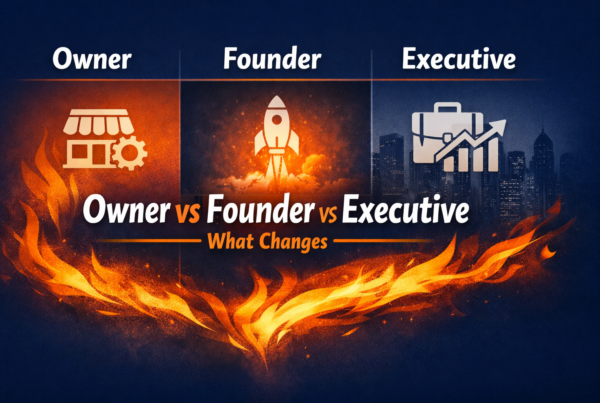Harnessing Coaching as a Strategic Leadership Tool, Not a Remedial Fix
Coaching as a strategic leadership tool, not a remedial fix, unlocks leaders’ potential and drives long-term success. This article explores how coaching as a strategic leadership tool not a remedial fix elevates leadership development, the strategic benefits involved, and effective ways to implement it within organizations.
Key Takeaways
- Leadership coaching has evolved from a remedial tool to a strategic catalyst for personal and organizational growth.
- Investing in leadership coaching enhances team cohesion, employee engagement, and overall organizational effectiveness.
- Core competencies like emotional intelligence, communication, and strategic thinking are critical for effective leadership coaching and aid in sustainable behavioural change.
“Ready to experience coaching as a strategic growth tool, not just a fix? Let’s explore how it can transform your leadership. Book a 15-minute call now.”
The Evolution of Coaching in Leadership

Leadership coaching has come a long way since its inception in the 1960s and 1970s, influenced by the principles of sports and psychology. During this period, coaching began to emerge as a distinct discipline, with companies recognizing the value of external advisors to enhance leadership practices. In the 1980s, the term ‘coach’ became popular in the business world, initiating a period where companies began investing in coaching to enhance leadership effectiveness.
The 1990s were a pivotal decade for coaching, with the establishment of organizations like the International Coaching Federation (ICF) formalizing coaching as a profession. This era saw the development of standardized practices and credentialing processes that helped to legitimize coaching as a valuable tool for personal and organizational development.
In the 2000s, coaching achieved global recognition and became a crucial component of leadership development programs across industries. Today, the professional coaching profession includes specializations like executive coaching, life coaching, and health coaching, each designed to address specific needs, including those of an executive coach.
Organizations such as the ICF maintain standards and enhance the credibility of coaching practices globally. This evolution reflects a growing understanding of coaching not just as a remedial tool but as a strategic intervention that empowers leaders to achieve their full potential.
“Curious how today’s coaching methods can elevate your leadership journey? Let’s chat about what’s possible. Schedule your free 15-minute session here.”
Strategic Value of Leadership Coaching

Leadership coaching offers many strategic advantages, positioning it as a developmental intervention rather than a remedial tool. At its core, the primary goal of leadership coaching is to empower leaders for personal and professional growth, enabling them to navigate complex challenges and drive organizational success. Investing in leadership coaching enables companies to unlock a leader’s full potential, resulting in a significant impact across the organization.
The ripple effect of effective leadership coaching is profound. It contributes to building stronger, more cohesive teams, enhancing overall performance, and fostering a culture of continuous improvement. Companies that invest in executive coaching signal their belief in a leader’s skills and potential, often resulting in increased employee engagement and a positive return on investment. The estimated annual value of the executive coaching industry, at $1.5 billion, underscores its significance as a strategic investment.
“Discover how coaching can unlock your team’s potential and boost engagement. Book a quick strategy call to learn how.”
Leadership coaching also plays a pivotal role in talent development, influencing overall growth within organizations. Empowering leaders to align their actions with core values and strategic goals through coaching enhances organizational performance and reveals their leadership potential. Investing in leadership coaching is thus not merely an expenditure but a strategic decision that yields substantial long-term benefits.
Core Competencies for Strategic Leadership Coaching
Effective leadership coaching hinges on a set of core competencies that enable coaches to influence client development positively. A great coach possesses a coaching mindset and foundational knowledge that are essential for fostering sustainable behavioural changes in the leadership skills approach. These competencies include emotional intelligence, communication skills, and strategic thinking, all of which are crucial in the coaching process.
Gathering feedback from clients’ supervisors, peers, and direct reports is also a critical aspect of effective coaching. This feedback helps assess a client’s leadership capabilities and identify areas for improvement. Focusing on these core competencies, coaching provides leaders with practical strategies and exercises for continuous growth and development.
The following subsections will delve deeper into each of these competencies, illustrating their importance in strategic leadership coaching.
“Want to strengthen your emotional intelligence and strategic leadership? A conversation could be the start. Grab a 15-minute call now.”
Emotional Intelligence
Emotional intelligence is a cornerstone of effective leadership coaching. It involves recognizing one’s own emotions and understanding how they can impact others in a coaching scenario. A leader who embraces emotional intelligence can enhance coaching effectiveness by addressing and managing their emotional responses. For instance, Chris, a senior leader who struggled with imposter syndrome, improved his empathy and authenticity through coaching, ultimately being promoted to a global leadership role.
High emotional intelligence enables leaders to navigate complex challenges and improve their leadership style. It fosters self-awareness, empathy, and effective communication, all contributing to a deeper understanding of stronger relationships and better decision-making. Embracing emotional intelligence allows leaders to foster both personal growth and the growth of their teams and organizations.
Communication Skills
Communication skills are fundamental to the coaching process, as they enable clear dialogue and constructive exchanges between the coach and the leader. Effective communication in coaching relies heavily on the ability to provide clear and constructive feedback to clients. Open-ended questions, for instance, are considered a cornerstone of effective coaching, encouraging deeper exploration of issues and greater self-awareness.
Open-ended questions in coaching sessions encourage reflective thinking in leaders, helping them identify strengths and areas for improvement. These questions foster a coaching conversation that is both engaging and insightful, facilitating professional growth and development.
Strong communication skills are thus essential for creating a productive coaching relationship and achieving successful coaching outcomes, as they often require the same skills.
Strategic Thinking
Strategic thinking is another critical competency for effective leadership coaching. It involves assessing situations critically to make informed decisions and foster continuous improvement in leadership roles. Leaders who engage in strategic thinking can analyze and evaluate options effectively, leading to better decision-making within their organizations.
A real-life example of strategic thinking in action is Joseph, who transitioned from a tactical to a strategic leadership role by grooming his direct reports. This shift allowed him to focus on high-level vision and planning, ultimately enhancing his leadership effectiveness.
Strategic thinking allows leaders to continually refine their leadership approach and drive sustainable growth organizational growth.
Implementing a Coaching Culture

Creating a coaching culture within an organization requires actionable steps and a commitment from senior leadership. Executives must secure support from senior leaders and equip leaders at all levels with coaching skills. An executive coaching initiative, for example, helped an organization shift from a turbulent transition to a thriving company culture by establishing trust and implementing values-aligned practices.
Leadership coaching helps individuals identify and overcome limiting beliefs, boosting their performance and fostering a growth mindset. Aligning their actions with core values helps leaders enhance their sense of purpose and accountability.
“Building a coaching culture starts with one leader—you. Let’s explore your first step. Book your introductory coaching call.”
The structured nature of coaching engagement supports leaders in navigating complex challenges and enhancing their effectiveness, contributing to a positive work environment and increased employee engagement.
Professional Development Programs
Professional development programs are crucial in establishing a coaching culture and facilitating continuous growth within an organization. Younger executives, for instance, typically respond positively to structured coaching programmes, increasing their personal development potential. Talented employees gain essential coaching skills through these programs, aiding in their professional growth and career progression on the career ladder.
Coaching programs also strengthen talent management by addressing critical success factors and providing opportunities for talented employees to reflect, recharge, and develop resilience. Formal recognition mechanisms for coaching can alleviate concerns among HR regarding its implementation, ensuring that coaching is seen as a valuable developmental intervention.
Establishing internal coaching programs or certifying leaders for coaching roles bolsters the coaching culture and supports continuous development.
Thinking of integrating coaching into your development programs? Let’s explore how to make it work. Schedule your call.”
Internal Coaching Networks
Establishing internal coaching networks can empower leaders and foster a sense of trust among participants. These networks encourage leaders to share insights, experiences, and best practices, creating a supportive environment for continuous learning and professional growth.
Leveraging the expertise of experienced leaders as coaches maximizes the impact of coaching programs and fosters a culture where leaders learn, collaboration, team dynamics, and mutual support thrive, including a mentoring relationship.
Evidence-Based Coaching Practices
Evidence-based coaching practices are crucial for achieving effective outcomes and ensuring long-term growth. Using evidence-based approaches allows organizations to design coaching interventions grounded in applied behavioural science and reflective practice, ensuring impactful and sustainable coaching.
These practices help measure coaching effectiveness, providing valuable insights into its impact on leadership development and organizational performance.
Measuring the Impact of Leadership Coaching

Measuring the impact of leadership coaching is essential for ensuring that coaching delivers the desired results and identifying areas for improvement. Working with a skilled coach helps develop and define goals, measure baseline conditions, monitor progress, and assess outcomes, which are crucial for understanding coaching effectiveness. Combining quantitative metrics and qualitative feedback provides a holistic view of coaching’s contribution to leadership development.
Effective leadership coaching requires organizations to set baseline measurements to evaluate progress and impact. Regular feedback from coaches helps effective leaders identify their strengths and areas for improvement, guiding their professional growth. Coaching equips leaders to enhance their effectiveness and drive results through executive coaching work.
Measuring the impact of coaching ensures that coaching programs align with strategic goals and contribute to organizational success.
“Curious about how coaching outcomes can be measured in your organization? Let’s define success together. Book a 15-minute strategy call.”
Setting Clear Objectives
Setting clear, measurable goals is essential for successful executive coaching as they guide the coaching process and provide a benchmark for success. At the beginning of a coaching relationship, it is crucial to develop assessable goals as a baseline for future progress.
Providing specific, timely, and actionable feedback during coaching sessions ensures alignment with these goals and allows for adjustments and improvements in the coaching approach.
Tracking Progress
Tracking progress is a vital component of the coaching process, as it helps to ensure accountability and continuous improvement. Leadership coaching’s effectiveness can be measured through a combination of qualitative and quantitative metrics, providing a holistic view of its contribution to leadership development.
Ongoing assessment of long-term outcomes is essential for understanding the sustained impact of coaching on leadership growth and organizational performance, highlighting the need for further research.
Assessing Long-Term Outcomes
Assessing the long-term outcomes of coaching is crucial for aligning coaching initiatives with organizational performance goals. Using both qualitative and quantitative metrics to evaluate coaching effectiveness allows organizations to measure growth in leadership capabilities and performance sustainability.
Implementing evidence-based coaching practices ensures that interventions are designed to deliver measurable and impactful results over the long term.
Overcoming Challenges in Strategic Coaching
Implementing strategic coaching is not without its challenges. Resistance to adopting coaching practices can stem from employees’ fears of failure and a preference for traditional management styles. Additionally, implementing coaching as a leadership style can be time-consuming, expensive, and difficult to operationalize. To address these challenges, organizations must actively engage employees and demonstrate the value of coaching aligned with leadership goals.
Participants may also associate coaching in the talent management context with limited and negative effects. Overcoming these perceptions requires a concerted effort to showcase the positive outcomes of coaching and its role in fostering personal and professional growth. Addressing these challenges helps organizations create a supportive environment for coaching and ensures successful implementation.
Limited Resources
Limited resources are a significant challenge for organizations seeking to implement effective coaching programs. Organizations often struggle with inadequate funding, which limits the training and support available for internal coaching.
Maximizing coaching impact can be achieved by leveraging low-cost or no-cost internal resources, such as experienced leaders as coaches. Overcoming financial constraints is crucial for enabling sustainable coaching practices that contribute to organizational success.
Variability in Coaching Quality
Ensuring consistency in coaching quality is critical for maximizing the effectiveness of leadership development. Organizations can enhance coaching practices by providing structured internal coaching programs and certifying leaders as coaches. The effectiveness of coaching can differ greatly between regions, often depending on the internal coaches’ engagement and dedication.
Maintaining high standards across the organization ensures that coaching programs deliver consistent and impactful results.
Resistance to Change
Resistance to change is a common barrier to implementing coaching practices. Employees often prefer familiar management styles and may fear the unknown elements of coaching. However, leaders like Susan have successfully transformed their organizations by overcoming fear-based challenges and fostering a creative and strategic work environment through values-based leadership.
Junior and middle management employees frequently seek practical advice and strategies during coaching, highlighting their need for applicable knowledge. Addressing these concerns and showcasing tangible benefits helps facilitate the adoption of coaching practices.
Case Studies of Successful Leadership Coaching

Leadership coaching has proven to be transformative in various organizational contexts. For instance, a global company operating in over 55 countries in the EMEA region successfully adapted coaching across diverse cultures and environments, demonstrating its versatility and impact. By integrating coaching into their leadership development programs, they fostered a culture of continuous improvement and strategic thinking, resulting in enhanced team performance and organizational growth.
Another notable example is John Mattone, one of the world’s top executive coaches, who has pioneered leadership transformation through individual leaders coaching. His work emphasizes the profound impact that personalized coaching can have on leaders, enabling them to unlock their potential and drive significant organizational change.
These case studies illustrate the tangible benefits of leadership coaching and its ability to create lasting positive executive coaching outcomes.
Summary
Leadership coaching is far more than a remedial fix; it is a strategic tool that fosters personal and professional growth, enhances team performance, and drives organizational success. By understanding its evolution, recognizing its strategic value, and mastering core competencies, leaders can harness the power of coaching to unleash their full potential. Implementing a coaching culture, measuring its impact, and overcoming common challenges are crucial steps in embedding coaching within the organizational fabric.
The transformative power of leadership coaching is evident in real-world examples where companies have successfully integrated coaching into their development programs. By embracing coaching as a strategic leadership tool, organizations can create a culture of continuous growth, innovation, and resilience. Let us embark on this journey of empowering leaders through coaching, unlocking their potential, and driving sustainable success.
“If you’re ready to invest in your leadership journey, the first step is easy. Book a no-obligation 15-minute call now and start the conversation.”
Frequently Asked Questions
What is the primary goal of leadership coaching?
The primary goal of leadership coaching is to empower leaders to achieve personal and professional growth, equipping them to effectively navigate challenges and enhance organizational success.
How can organizations measure the impact of leadership coaching?
Organizations can effectively measure the impact of leadership coaching by establishing clear, measurable goals and utilizing a combination of qualitative and quantitative metrics to assess progress and long-term outcomes in alignment with their performance objectives.
What are the core competencies for effective leadership coaching?
Effective leadership coaching requires emotional intelligence, strong communication skills, and strategic thinking. These competencies empower coaches to drive meaningful development and foster lasting behavioral change in their clients.
How can organizations overcome resistance to adopting coaching practices?
To effectively overcome resistance to coaching practices, organizations should engage employees actively, showcase the alignment of coaching with leadership goals, and acknowledge concerns about traditional management styles. This approach fosters a more accepting environment for coaching initiatives.
What role do internal coaching networks play in fostering a coaching culture?
Internal coaching networks are essential in cultivating a coaching culture as they empower leaders to share experiences and foster trust among participants, creating a supportive environment for ongoing learning and development. This collaborative approach enhances professional growth and reinforces the value of coaching within the organization.



